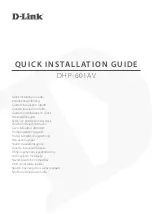
Configuring Device Security
Defining Access Control
ESW 500 Series Switches Administration Guide
158
5
•
Protocol — Creates an ACE based on a specific protocol. The possible field
values are:
-
ICMP
—
Internet Control Message Protoco
l (ICMP). The ICMP allows the
gateway or destination host to communicate with the source host. For
example, to report a processing error.
-
IGMP
—
Internet Group Management Protocol
(IGMP). Allows hosts to
notify their local switch or router that they want to receive transmissions
assigned to a specific multicast group.
-
IP
—
Internet Protocol
(IP). Specifies the format of packets and their
addressing method. IP addresses packets and forwards the packets to
the correct port.
-
TCP
—
Transmission Control Protocol
(TCP). Enables two hosts to
communicate and exchange data streams. TCP guarantees packet
delivery, and guarantees packets are transmitted and received in the
order the are sent.
-
EGP
—
Exterior Gateway Protocol
(EGP). Permits exchanging routing
information between two neighboring gateway hosts in an autonomous
systems network.
-
IGP
—
Interior Gateway Protocol
(IGP). Allows for routing information
exchange between gateways in an autonomous network.
-
UDP
—
User Datagram Protocol
(UDP). Communication protocol that
transmits packets but does not guarantee their delivery.
-
HMP
—
Host Mapping Protocol
(HMP). Collects network information
from various networks hosts. HMP monitors hosts spread over the
internet as well as hosts in a single network.
-
RDP
—
Remote Desktop Protocol
(RDP). Allows a clients to
communicate with the Terminal Server over the network.
-
IDPR
— Matches the packet to the
Inter-Domain Policy Routing
(IDPR)
protocol.
-
RSVP
— Matches the packet to the
ReSerVation Protocol
(RSVP).
-
GRE
—Matches the packet to the Generic Routing Encapsulation (GRE)
protocol.
-
ESP
—Matches the packet to the Encapsulating Security Payload (ESP)
protocol.
















































